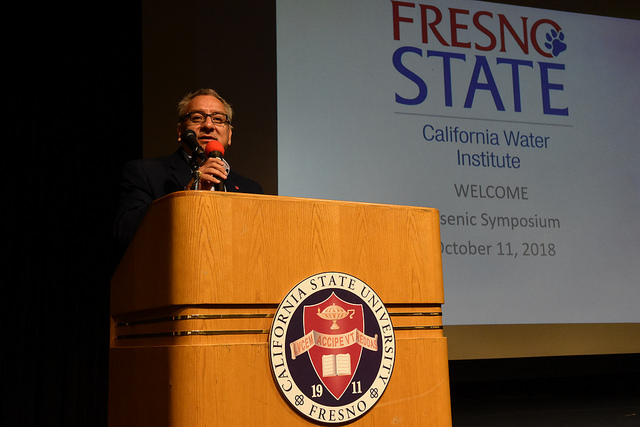From discussions on arsenic in drinking water, to research on using natural products to treat prostate cancer and philosophical conversations on peace, Fresno State offers opportunities for all to learn, engage and be part of a solution.
About 145 community members, staff and students participated in the Arsenic Symposium on Thursday, Oct. 11, to get an in-depth look at the sources and causes of arsenic in the San Joaquin Valley groundwater. The event was hosted by the California Water Institute at Fresno State.
Arsenic is a natural element existing in the Earth’s crust, but thousands of years of land erosion and weatherization of rocks and minerals have allowed arsenic to find its way to the San Joaquin Valley floor and the groundwater aquifer.
Drinking a high concentration of arsenic over an extended period of time can be harmful and increases the risk for certain cancers, experts say. Arsenic is a concern in the Valley’s small public water systems serving rural and disadvantaged communities and private property owners.
Alumnus Chris Johnson, owner of Aegis Groundwater Consulting in Fresno, spoke about his graduate research on arsenic in Hanford groundwater during the 1990s. The results showed that shallow wells have greater concentration of arsenic than deep wells.
There needs to be an extensive geological and geothermal assessment of the area before building a well, Johnson said. “We need to design smarter wells and build smarter wells,” he said.
Other speakers included Dr. Beth Weinman from the Earth and Environmental Sciences Department in the College of Science and Mathematics; Scott Fendorf, soil scientist and biogeochemist from Stanford University; and scientists from the California Water Science Center and the Water Resources Control Board.
“The Arsenic Symposium was successful in attracting a broad and diverse group of participants and Fresno State faculty and students,” said Thomas C. Esqueda, assistant vice president in Water and Sustainability at Fresno State. “We look forward to working with these diverse groups to do the hard work of reducing arsenic in drinking water for San Joaquin Valley residents. Working together we can solve this issue, and the many other water issues facing the San Joaquin Valley.”
Provost’s Awards Lecture Series
With so many deserving nominees, the Provost’s Awards Committee couldn’t decide on one winner for the 2017-2018 Research, Scholarship and Creative Accomplishment category, so two faculty members received the honor.
“It was choosing between a cure for cancer or world peace,” said interim Provost Robert Harper.
During the Oct. 11 Provost’s Awards Lecture Series, Dr. Qiao-Hong Chen, associate professor of chemistry, presented her research on engineering improved derivatives of natural dietary products for the treatment of advanced metastatic castration-resistant prostate cancer.
One of the most common questions she gets is why do this work when there are so many drugs out there now, she said. The answer is simple: Prostate cancer is the second-leading cause of cancer death in American men. And while there are a lot of drugs out there, many people become resistant to them, she said.
Chen and her students are working to develop new derivatives of dietary substances like curcumin and genistein to treat prostate cancer.
Dr. Andrew Fiala, professor of philosophy and director of the Ethics Center, spoke about peace as presented in his new book, “Transformative Pacifism.”
“Most philosophers are more interested in war than peace,” Fiala said. “There’s been an effort to move philosophy toward peace.”
He puts the idea of peace front and center instead of focusing on “just war,” or the theory of how and why wars are fought. Fiala looks at what it means to practice peace.
The next lecture will be held from 3:30 to 5 p.m. on Thursday, Oct. 25, in the Henry Madden Library (Room 2206). Dr. Rajee Amarasinghe of the Department of Mathematics will speak on "Path of Least Resistance: Integrating Teaching, Research and Service with the Help of Your Colleagues.”
For a complete schedule, visit the Provost's Awards Lecture Series Fall 2018.
|


